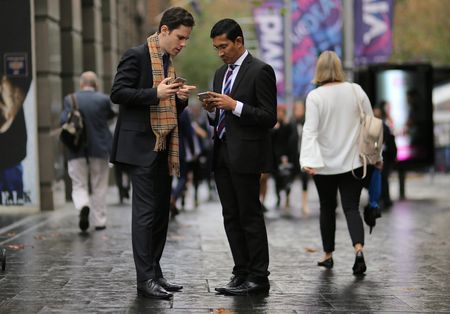By Wayne Cole
SYDNEY (Reuters) -Australia’s jobless rate matched five-decade lows in October as employment climbed by double market forecasts, a sign it will take further increases in interest rates to loosen the drum-tight labour market.
Figures from the Australian Bureau of Statistics on Thursday showed net employment rose 32,200 in October from September, when they fell a revised 3,800. That came as a surprise to many analysts who had looked for a gain of only 15,000.
The jobless rate dipped to 3.4%, from 3.5%, again beating forecasts of a slight rise, while hours worked rebounded by a strong 2.3% as fewer people than normal took leave in the month.
Full-time employment jumped 47,100, bringing total job gains for the 12 months to October to a massive 762,000.
The broad strength of the report quashed talk that the Reserve Bank of Australia (RBA) might pause its policy tightening in December, with markets now almost fully priced for another quarter point hike to 3.10%.
That would bring the total tightening since May to 300 basis points, easily the most aggressive in modern history.
While policymakers still say there are more hikes to come, they have recently emphasised the amount already done and the length of time this will take to feed through to mortgages.
RBA Deputy Governor Michele Bullock has also stressed that, having spent half a century getting back to full employment, they would like to keep those gains even if it means tolerating higher inflation for longer.
The RBA sees unemployment rising only slightly to 3.7% by the end of next year, while forecasting inflation at 4.7% and still well above its long-term target band of 2-3%.
The emphasis on keeping unemployment low has seen markets trim expectations for how far rates might go, with futures now implying a peak around 3.80% compared to over 4% a month ago.
Much will depend on how labour costs develop, with data on Wednesday showing annual wage growth accelerated to a decade-high of 3.1% in the third quarter but remained well short of the 4%-plus levels that would threaten inflation.
“Australia is not facing a wage price spiral like has been observed in other jurisdictions,” argues Gareth Aird, head of Australian economics at CBA.
“We are confident that we are past the peak tightness in the labour market,” he added, noting vacancies had eased and job applicants were increasing as migration revived.
Longer-term visa holders rose by a net 17,000 in September alone, while almost 36,000 students arrived compared to virtually zero a year earlier, when the COVID-19 pandemic had shut the borders.
(Reporting by Wayne Cole; Editing by Jacqueline Wong and Ana Nicolaci da Costa)

